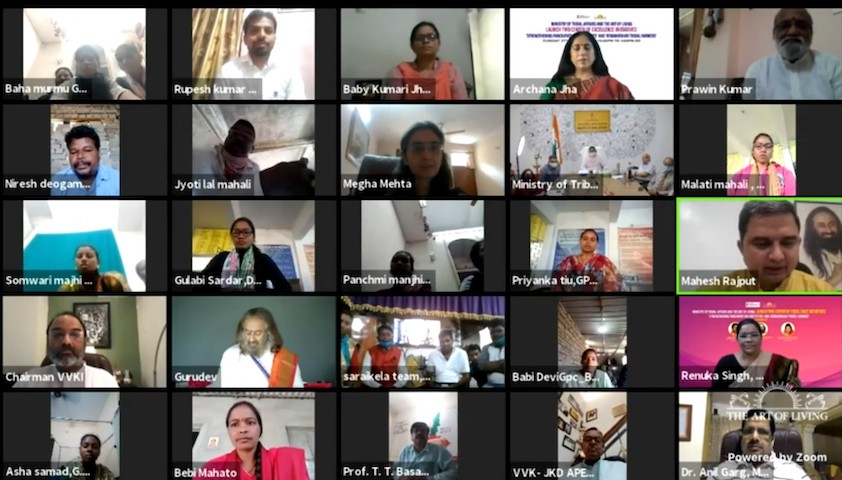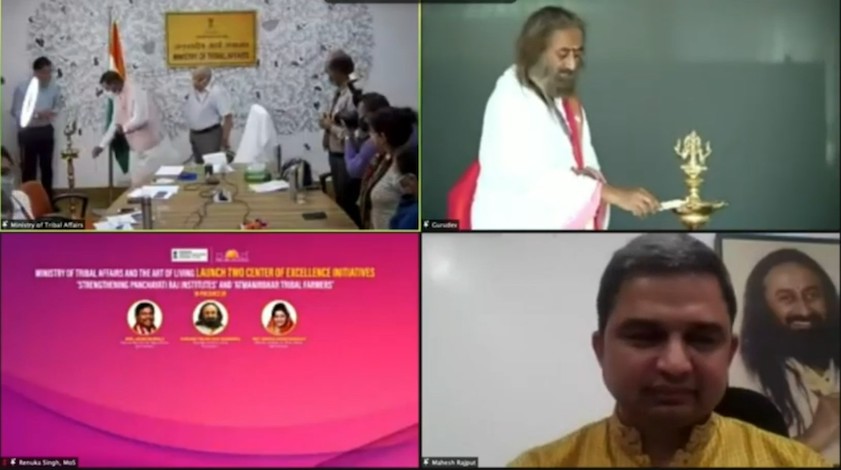Bangalore, India
October 27, 2020
Gurudev Sri Sri Ravi Shankar launched two Centers of Excellence(CoE) with Mr. Arjun Munda, (Union Minister, Tribal Affairs) and Ms. Renuka Singh Saruta (Minister of State, Tribal Affairs).
“We need to learn a lot from the tribal cultures,” Gurudev said in his virtual address, “When I travelled around in these places, I saw how they kept their surroundings and the environment clean. We have to preserve their culture and way of life, and give them the support they need.” Gurudev spoke about The Art of Living tribal school being run in Ghatsila, where children are taught about their tribal culture and tradition while also giving them modern education and vocational skills that would ensure they do not remain unemployed. More than 700 such schools are being run all over the country in rural and tribal areas.
Launched the centers of excellence with @mundaarjun, Minister Tribal Affairs & @RenukaSinghBJP, MoS Tribal Affairs. An initiative of @artofliving & @tribalaffairsin, these centers will focus on creating leaders for strengthening Panchayati Raj Institutions & empowering farmers. pic.twitter.com/pHhC8HQAXR
— Gurudev Sri Sri Ravi Shankar (@Gurudev) October 27, 2020
Under the first CoE, the organization will train 900 youths belonging to Scheduled Tribe communities as change agents in the community. The project will run in 30 villages, in 6 different blocks and 5 districts of Jharkhand.
“This program launched today is important for the farming community and the holistic development of Panchayati Raj,” said Mr. Arjun Munda, Hon. Minister of Tribal Affairs. “We are positive of starting the project in Gurudev’s presence to bring harmony between constitutional rights, development and their social structure so that their natural system is retained. This will set an example of empowerment of rural and tribal areas. Development of the tribal communities, who are known for their sweetness, is important from societal development point of view. Environment sustainability is ensured by them by their dedication to preserve it.”
“I am very happy that, with the support of The Art of Living, our ministry will work towards upliftment of the scheduled tribes to make them self-dependent, bring them dignity, and strengthen Panchayati Raj institutions,” said Ms. Renuka Singh, Minister of State, in the Ministry of Tribal Affairs.
Art of Living will be implementing its widely successful community empowerment modules by training the youths for personality improvement and leadership skills and encouraging them to engage in community service; the initiatives taken thus will be self-sustaining with the help of trained youths to create a long lasting impact in these villages.
The second CoE will focus in training 10,000 tribal farmers in Aurangabad District of Maharashtra on sustainable Natural Farming.
Gurudev Institute of Agricultural Sciences and Technology (SSIAST), works with 22 lac farmers promoting Natural Farming across India. SSIAST has now undertaken the project “Making Atmanirbhar Tribal Farmers” with the Ministry of Tribal Affairs, in the Aurangabad District of Maharashtra.
In this present 3-year project, SSIAST seeks to adopt 10 tribal villages and train 10,000 farmers in sustainable Natural Farming techniques. This model is based on training 10 mentors amongst the local youth, who will handhold the farmers during this period. SSIAST will ensure that the farmers will receive PGS organic certification and marketing opportunities will be made available to them. SSIAST will also establish dynamic indigenous seed banks for preserving local biodiversity and empowering farmers to be seed keepers.
“This project will focus on creating self-reliance among tribal farmers. It seeks to preserve and revive the Traditional Ecological Knowledge of tribal communities and protect them for the negative effect of chemical agriculture”, said Dr Prabhakar Rao, Trustee, SSIAST.



